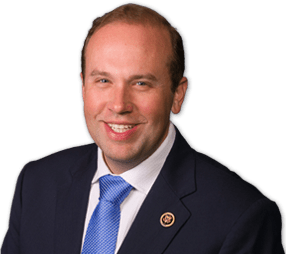Press Releases
Smith Applauds the Supreme Court Decision to Block Biden Employer Vaccine MandateWASHINGTON, D.C. – On January 13, 2022, in the cases of NFIB v. OSHA and the State of Ohio v. OSHA, the Supreme Court of the United States blocked the Biden Administration’s Occupational Safety and Health Administration’s (OSHA) “emergency” rule forcing private companies to enforce a COVID-19 vaccine mandate from going into effect. OSHA is now prevented from implementing the mandate until SCOTUS issues its ruling on the merits of the case, expected later this year. “Working-class Americans who have kept this country running shouldn’t have to choose between their medical freedom or their livelihood, and this ruling cuts them a break,” said Rep. Jason Smith. “While I am glad the Court agreed with the argument I presented them last week, this is just the first step. I hope they will clearly rule later this year that the federal government can’t require citizens to abandon their health care freedom to satisfy the whims of the president. I will keep fighting for Missourians’ right to live freely and make the best decisions for themselves and their families.” Congressman Smith joined 136 members of the House and 47 Senators in sending an amicus brief to the Supreme Court, urging them to strike down the administration’s vaccine mandate. In their brief, they highlighted the lack of congressional authorization for such action, an argument that the justices cited in their decision to block the rule. On October 27, 2022, Smith, as Republican Leader of the House Budget Committee, along with House Oversight and Reform Committee Republican Leader James Comer excoriated the Biden administration’s Office of Management and Budget (OMB) over the federal rulemaking process used to impose a national vaccine mandate on employers and called on the OMB Acting Director to immediately withdraw the rule. If implemented, the OSHA rule would affect 84 million Americans by requiring employers of 100 employees or more to require their employees to be vaccinated or to submit to weekly testing and wear masks at work. Further, many employers who may not have been impacted pointed to the OSHA guidance as justification for implementing their own vaccine mandates. Now, states must decide whether employers should have the authority to vaccinate their workforce. Congressman Smith is a co-author of two pieces of legislation – the Freedom from Mandates Act and the Health Freedom for All Act, which would have prevented this rule from going into effect. In a separate second case, Biden v. Missouri, challenging the Centers for Medicare and Medicaid Services’ (CMS) rule that requires health care workers to be vaccinated to be eligible for Medicare reimbursement, the Supreme Court declined to issue a stay. “I am disappointed that the Supreme Court failed to consider the real-world consequences of the Biden administration’s health care vaccine mandate,” said Rep. Smith. “Without protection from the rule, rural Missouri is likely to face serious workforce shortages because many providers still have their own questions about the vaccines. It is unacceptable for the Biden administration to risk severe health consequences in rural areas, and it’s disheartening that SCOTUS failed to understand this very real threat.” Under the CMS rule, which affects 17 million Americans, healthcare workers are required to be fully vaccinated or risk termination. There is no testing alternative and health clinics face losing access to Medicare and Medicaid for non-compliance. Providers will now have to be in compliance with CMS’ rule by March 28, 2022 or risk termination, unless the Supreme Court’s decision in the case overturns the rule before then. ### |


